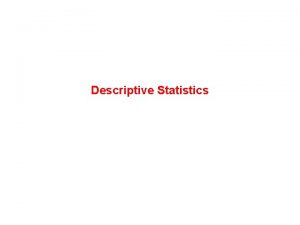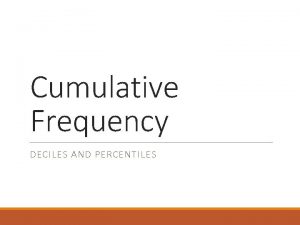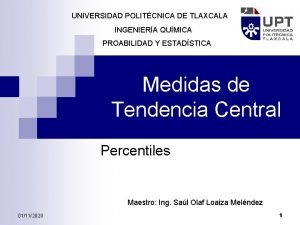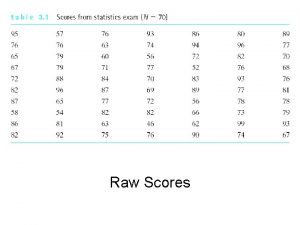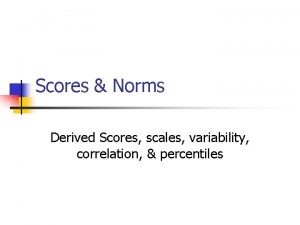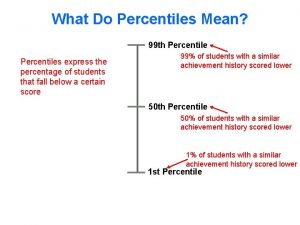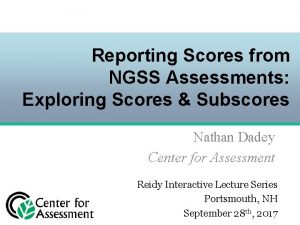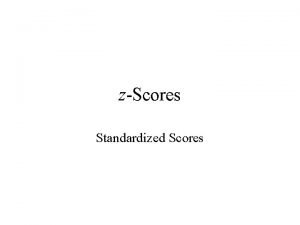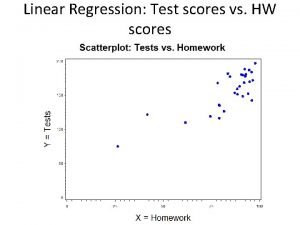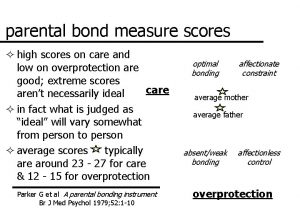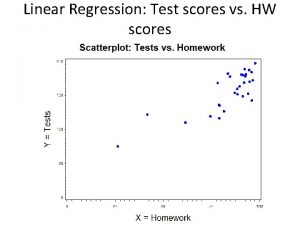Z Scores and Percentiles Lesson 3 1 Part

















- Slides: 17

Z Scores and Percentiles Lesson 3. 1 Part 2

Histograms ¢ What do we remember about histograms? ¢ For a data set, What does the mean tell us? l What does the standard deviation tell us? l

Normal Distribution ¢ A family of distributions (histograms) with a symmetrical bell shape

Standard Normal Distribution A special case of the normal distribution with a mean of 0 and a standard deviation of 1.

Normal vs. Standard Normal ¢ Most normal curves are not standard normal curves l l They may be translated along the x axis (different means) They might be wider or thinner (different standard deviations) standard σ>1 σ<1

Why is this a problem? ¢ Imagine there are two MDM 4 U classes. Mr. X teaches one section, while Ms. Y teaches the other one. l They both have a quiz l Andy scored 60% on Mr. X’s test, while Mason scored a 70% on Ms. Y’s test. Who did better? l

Working between distributions l ¢ Andy scored 60% on Mr. X’s test, while Mason scored a 70% on Ms. Y’s test. Who did better? It is hard to compare these two different quizzes… maybe Mr. X’s was tougher, and a 60% on his quiz is better than a 70% on Ms. Y’s quiz How many standard deviations away from the mean are these scores? This would tell us how we should compare them.

Z-scores ¢ The z-score for a given piece of data is how far away it is from the mean – it counts the number of standard deviations ¢ For example: a z-score of 2 means the data is two standard deviations above the mean A positive z-score indicates that the value lies above the mean. A negative z-score indicates that the value lies below the mean. ¢ ¢

Calculating z-scores The data The mean number of standard deviations x is away from the mean The deviation The z-score is the deviation divided by the standard deviation The standard deviation

Ex. # 1: Calculating Z-Scores For the distribution with a mean of 20 and a standard deviation of 4, determine the number of standard deviations each piece of data lies above or below the mean. a) x = 11 b) x = 25

Why z-scores? convert to standard

Why z-scores? Z-Scores allow us to convert any normal distribution to a standard normal distribution ¢ This lets us compare distributions that have different means and standard deviations. ¢

Ex. #2 Cayley: got an 84, mean was 74, standard dev was 8 Lauren: got an 83, mean was 70, standard dev was 9. 8 Cayley’s z-score: Lauren’s z score was higher – she did “better” when compared with the rest of her class

Percentiles ¢ ¢ ¢ Percentiles are another way to talk about z-scores the kth percentile is the data value that is greater than k% of the population The table on page 606 and 607 relates zscores to percentiles. Lauren: her z-score was 1. 32 Looking up 1. 32 in the z-score table, you find 0. 9066 Lauren’s mark is at the 90. 66 percentile, or the 90 th percentile (always round down) She did better than 90% of the students

Ex. #3: Calculating Percentiles Fish in a lake have a mean length of 20 cm and a standard deviation of 5 cm. Find the percent of the population that is less than or equal to the following lengths (the percentile). a) 23 cm b) 11 cm c) 30 cm

Ex. #4: See the textbook question on page 145 (Example 5). a) b) c)

Practice Questions Page 148 #4, 5, 9, 14
 Converting z score to percentile
Converting z score to percentile Aimsweb scoring chart
Aimsweb scoring chart Disc personality combinations
Disc personality combinations Georgia milestones score range
Georgia milestones score range Typologies are nominal composite measures
Typologies are nominal composite measures Deciles and percentiles
Deciles and percentiles How to find percentile in cumulative frequency
How to find percentile in cumulative frequency Iq percentile
Iq percentile Student growth percentiles
Student growth percentiles Formulas de percentiles
Formulas de percentiles Tabla de presión arterial
Tabla de presión arterial Csa percentiles
Csa percentiles Surgery shelf percentile 2020
Surgery shelf percentile 2020 Bigotes boxplot
Bigotes boxplot Percentiles estadistica
Percentiles estadistica Raw scores and frequency distribution
Raw scores and frequency distribution Four score and seven years ago our fathers brought forth
Four score and seven years ago our fathers brought forth Four score and seven years meaning
Four score and seven years meaning





